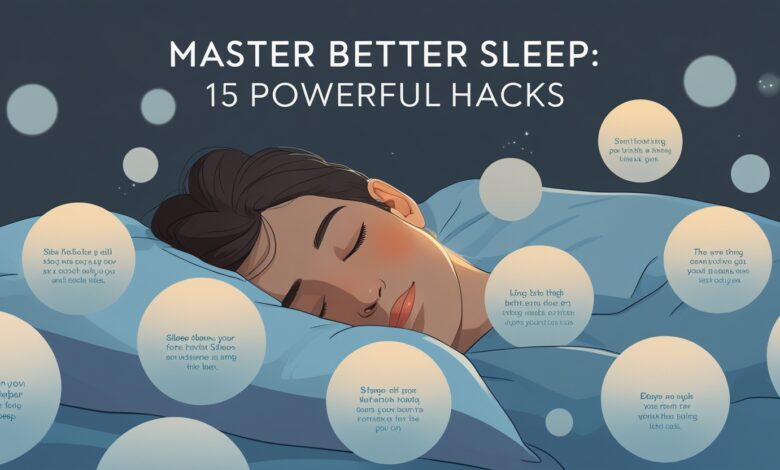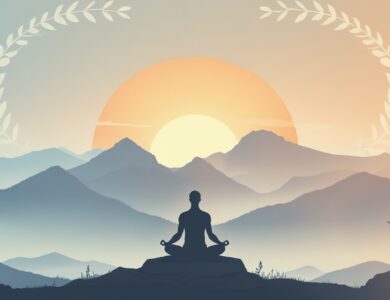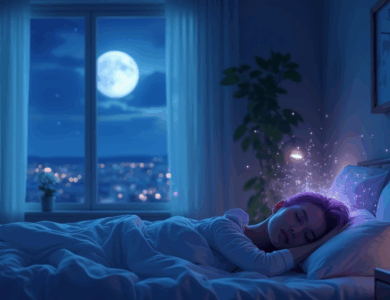Master Better Sleep: 15 Powerful Hacks to Wake Up Rested and Energized

Understanding the Science of Sleep
To truly master better sleep, it helps to first understand what’s going on behind the scenes. Sleep isn’t just “rest.” It’s a complex biological process that impacts almost every system in your body.
What Happens During Sleep?
During sleep, your brain and body cycle through different stages—light sleep, deep sleep, and REM (Rapid Eye Movement). Each stage serves a unique purpose:
- Light sleep helps the body start to unwind.
- Deep sleep is when most physical healing and restoration happen.
- REM sleep supports memory, learning, and emotional processing.
Without moving through these phases in order, your sleep quality drops—even if you’re in bed for 8 hours.
Stages of Sleep and Their Importance
Here’s a quick breakdown:
| Stage | Function | Time in Cycle |
|---|---|---|
| N1/N2 | Light sleep, transition phase | 50–60% |
| N3 | Deep sleep, physical recovery | 15–20% |
| REM | Dream phase, brain activity boosts | 20–25% |
Sleep cycles repeat roughly every 90 minutes. Disruption at any stage can lead to grogginess and fatigue the next day.
Why Quality Sleep Is Non-Negotiable
You can survive a few nights of poor sleep, but chronic sleep deprivation affects everything—from how clearly you think to how well your body fights off illness.
Benefits of Good Sleep
- Improved memory and cognitive function
- Better mood and emotional stability
- Stronger immune system
- Regulated metabolism and hormone balance
Risks of Poor Sleep
- Higher risk of heart disease, diabetes, and obesity
- Depression and anxiety flare-ups
- Impaired decision-making and focus
- Weakened immune function
Mastering better sleep is about protecting your long-term health—not just preventing yawns.
Identifying Sleep Disruptors
Before you improve sleep, it’s important to understand what might be sabotaging it.
Common Culprits
- Blue light from screens delays melatonin production
- Caffeine and alcohol disrupt sleep cycles
- Inconsistent sleep times confuse your internal body clock
Try cutting screen time 60 minutes before bed and limiting stimulants after 2 p.m.
Creating a Personalized Sleep Schedule
Not everyone’s sleep needs are the same. Some thrive on 6.5 hours; others need 9. The key is consistency.
Find Your Chronotype
Are you a morning bird or a night owl? Align your bedtime and wake-up time accordingly to maximize deep sleep and energy levels.
Optimizing Your Bedroom Environment
Small tweaks can turn your room into a sleep sanctuary.
Key Changes:
- Temperature: Keep it cool (60–67°F)
- Darkness: Use blackout curtains or sleep masks
- Noise: Try white noise machines or earplugs
- Bedding: Invest in a comfortable mattress and breathable sheets
Evening Rituals That Calm the Mind
To truly master better sleep, crafting a calming bedtime routine is key. The brain loves cues—and a consistent wind-down period signals your body that it’s time to rest.
Relaxing Pre-Sleep Activities
- Journaling: Offload racing thoughts to paper.
- Reading (physical books): Helps your mind drift gently into a relaxed state.
- Herbal teas: Chamomile, lavender, or valerian root can naturally ease tension.
- Aromatherapy: Scents like lavender and eucalyptus help soothe the nervous system.
Avoid action-packed TV shows or intense workouts right before bed—they can spike adrenaline and delay sleep onset.
The Role of Nutrition in Better Sleep
What you eat (and when you eat) directly influences how well you sleep. Some foods promote melatonin, while others can keep you up all night.
Top Sleep-Friendly Foods
- Bananas: Rich in magnesium and potassium
- Cherries: Natural source of melatonin
- Oats: Promote serotonin production
- Almonds & walnuts: Healthy fats that support brain function
What to Avoid
- Caffeine (after 2 PM)
- Spicy or acidic foods (cause indigestion)
- High-sugar desserts (blood sugar spikes)
Eating a light, balanced dinner at least 2–3 hours before bed supports better digestion and more restful sleep.
Mastering Stress Management Before Bed
Unmanaged stress is a major roadblock to restful sleep. Fortunately, you can calm your nervous system using a few mindful practices.
Simple Stress-Busting Techniques
- Deep breathing: Try the 4-7-8 method (inhale 4s, hold 7s, exhale 8s)
- Progressive muscle relaxation: Tense and release muscle groups slowly
- Guided meditation: Use apps like Calm or Insight Timer
- Yoga or light stretching: Signals your body it’s safe to relax
Even just 5 minutes of these techniques can make a noticeable difference in how quickly you fall asleep.
The Impact of Daylight and Physical Activity
One of the best ways to master better sleep is to set your internal body clock using natural light and movement.
Timing Is Everything
- Morning sunlight: Exposing your eyes to natural light soon after waking helps regulate melatonin levels and resets your circadian rhythm.
- Exercise: Aim for at least 30 minutes of movement daily, preferably earlier in the day. Evening workouts can be too stimulating for some people.
Avoid staying indoors all day—even a 10-minute walk outside helps align your body with the day-night cycle.
Leveraging Technology Mindfully
Tech can disrupt sleep—or improve it, if used smartly.
Tools to Help (Not Hinder)
- Blue light blockers: Glasses or screen filters reduce melatonin suppression.
- Night mode: Enable “Night Shift” or “Night Light” on your devices after 7 PM.
- Sleep apps: Tools like Sleep Cycle or Headspace track patterns and guide relaxation.
Keep screens out of your bedroom if possible—or at least use them in low light.
Napping Wisely Without Ruining Night Sleep
A well-timed nap can recharge your brain. But if done wrong, it might interfere with your main sleep cycle.
Best Napping Practices
| Nap Type | Duration | Benefits |
|---|---|---|
| Power Nap | 10–20 mins | Boosts alertness, no grogginess |
| Long Nap (rare) | 60–90 mins | Full sleep cycle, improves memory |
Avoid napping after 4 PM, and set an alarm to prevent oversleeping.
Sleep Aids: Natural and Medical Options
If you’ve tried everything and still struggle to fall asleep, you may benefit from short-term aids.
Natural Remedies
- Melatonin supplements: Best for travel or shift changes
- Magnesium: Helps calm muscles and nerves
- Herbal blends: Look for valerian root, passionflower, or skullcap
When to See a Specialist
Chronic insomnia, sleep apnea symptoms, or regular night wakings warrant a visit to a sleep specialist. A proper diagnosis can reveal issues like restless leg syndrome or circadian rhythm disorders.
Building a Consistent Sleep-Wake Routine
To master better sleep long-term, you need a set rhythm. The body thrives on routine.
Simple Habits to Lock In
- Wake up and go to bed at the same time daily—even weekends.
- Keep a sleep journal to track patterns, triggers, and progress.
- Celebrate small wins: One night of great sleep is motivation for the next.
Even a 15-minute shift toward regularity can make a difference.
FAQs About Mastering Better Sleep
1. What’s the ideal number of hours of sleep for adults?
Most adults need 7–9 hours. Sleep needs vary by age, activity level, and genetics.
2. How do I stop waking up in the middle of the night?
Try lowering stress, avoiding heavy meals, and maintaining a cool bedroom environment. If it persists, consult a doctor.
3. Is melatonin safe to use every night?
Short-term use is generally safe, but regular reliance may disrupt your natural sleep hormone cycle.
4. Can poor sleep really affect weight gain?
Yes. Lack of sleep affects hunger hormones like ghrelin and leptin, increasing cravings and fat storage.
5. Does watching TV before bed really harm sleep?
Yes, especially if the content is stimulating. Blue light from screens delays melatonin.
6. What should I do if I can’t fall asleep after 30 minutes?
Get up and do a low-light, calm activity like reading. Return to bed when you feel drowsy.
Final Thoughts: Start Sleeping Smarter Tonight
Mastering better sleep isn’t about making massive overnight changes. It’s about small, intentional steps that lead to lasting results. From dimming the lights an hour earlier to adding a cup of chamomile tea to your evening ritual, each change brings you closer to restful nights and energized mornings.
Start with one or two habits from this guide, track how you feel, and keep building from there.



